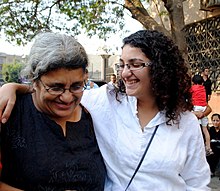Laila Soueif
Laila Soueif (born 1956) is an Egyptian human and women's rights activist, a mathematician and professor at Cairo University. Al Jazeera has called her "an Egyptian revolutionary".[1] She is the widow of fellow activist Ahmed Seif El-Islam, and all three of their children are noted activists: Alaa Abd El-Fattah, Sanaa Seif, and Mona Seif. Her sister is the novelist Ahdaf Soueif.
Laila Soueif | |
|---|---|
 Soueif with her daughter Mona Seif | |
| Born | 1956 (age 63–64) |
| Nationality | Egyptian |
| Alma mater | Cairo University |
| Occupation | human and women's rights activist, and mathematician |
| Title | Professor of mathematics, Cairo University |
| Spouse(s) | Ahmed Seif El-Islam (died 2014) |
| Children | Alaa Abd El-Fattah Sanaa Seif Mona Seif |
| Relatives | Ahdaf Soueif (sister) |
Early life
Soueif was born in 1956, the daughter of university professors.[2] She went to her first political protest in 1972 in Cairo's Tahrir Square, when she was just 16.[2] Two hours later her parents tracked her down and brought her home, "From that, I learned that it was easier to defy the state than to defy my parents".[2]
Soueif studied mathematics at Cairo University in the mid-1970s.[2]
Career
Soueif is a professor of mathematics at Cairo University.[3][1]
Soueif is the founder of the 9 March Professors' Movement for Universities Independence.[3]
In November 2014, Soueif and her daughter Mona Seif ended a 76-day hunger strike, protesting against the imprisonment of her son Alaa Abd El-Fattah, but El-Fattah and his sister Sanaa Seif reportedly remained on hunger strike.[3]
Personal life
Soueif met her future husband, Ahmed Seif El-Islam, while at Cairo University in the mid-1970s, where he was already the "leader of an underground communist student cell calling for revolution".[2] He became a left-wing human rights activist and lawyer, and they were married until his death in 2014.
They are the parents of the activists Alaa Abd El-Fattah, Sanaa Seif and Mona Seif.[4][1] Her sister is the novelist Ahdaf Soueif.[5]
References
- "An Egyptian revolutionary". www.aljazeera.com. Retrieved 12 November 2017.
- Al-awsat, Asharq. "Laila Soueif Archives - ASHARQ AL-AWSAT English Archive". ASHARQ AL-AWSAT English Archive. Retrieved 12 November 2017.
- "Loading site please wait..." dailynewsegypt.com. Retrieved 12 November 2017.
- "Family of jailed Egypt activists on hunger strike". timesofisrael.com. Retrieved 12 November 2017.
- Scott Anderson (4 May 2017). Fractured Lands: How the Arab World Came Apart. Pan Macmillan. p. 48. ISBN 978-1-5098-5272-7. Retrieved 12 November 2017.
External links
- O'Connor, John J.; Robertson, Edmund F., "Laila Soueif", MacTutor History of Mathematics archive, University of St Andrews.